
 |
 |
 |
 |
|
|
رقم المشاركة : ( 13471 ) | ||||
|
† Admin Woman †
|
Elder Iakovos Tsalikis – A Glimpse of His Holy Life
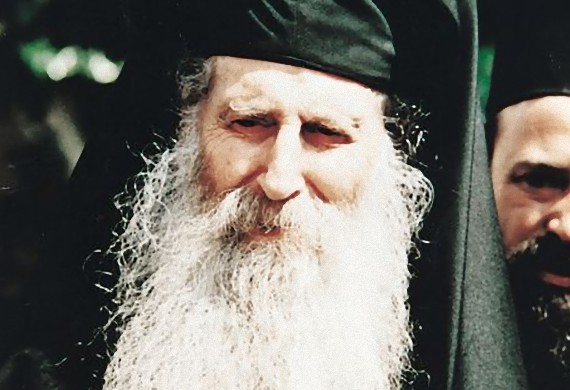 From a young age little Iakovos (which was his name even at baptism) loved the Lord and His Bride, the Church. Born in Livisi, in Asia Minor (modern-day Turkey), he and his family were forced to immigrate to Greece during the exchange of populations. Eventually settling on the island of Evia, he lived with his family in a storehouse with other refugees, blankets separated the individual living quarters. Little Iakovos would lift these blankets in order to “cense” his neighbours with the toy censor he made out of a roof tile. His holiness was noticed very early, though he wasn’t fully understood and suffered a great deal of derision; children would call him “geronda” and “father”. He would arise in the night for vigil, chant throughout the day, and was even entrusted with the keys to the village church since a priest came only twice a month to serve the divine services. Throughout his life he lived in great poverty and fasting. As a young man he would chant in the church barefoot because he could not afford shoes. People ridiculed him but he often had visions of saints and angels which would comfort and strengthen him in his resolve to live for Christ. After serving in the Greek army and working to save enough money for his sister’s dowry, he was free to become a monk. Wanting to follow in his ancestors’ footsteps (seven generations of priest-monks, a bishop and a saint), he initially wanted to become a monk in the Holy Land. Before setting out he visited St. David’s Monastery for what he thought would be the last time and was instead spiritually persuaded to stay there by St. David himself. Through many hardships the elder increased in holiness and grace during his time at St. David’s, eventually becoming the abbot and receiving countless souls whom he guided and comforted. St. David was like his own spiritual father, appearing to him on many occasions and hearkening to his many prayers and supplications. The elder reposed on November 21, 1991, the Feast of the Entrance of the Mother of God into the Temple. May we have his blessing! Wise Counsel from the Elder: (from Precious Vessels of the Holy Spirit) “We are not sanctified by the place in which we live, but by the way we live.” “The faithful shouldn’t tell others of things they have confessed, of details of their life or their spiritual endeavour.” “Chase away the bad thoughts and fantasies that the devil presents. Don’t even notice them.” “Don’t hesitate [to come to confession]. Don’t be ashamed. Whatever you may have done, even the greatest of sins, the spiritual father has power from the Lord Christ Himself and from the Apostles to forgive you with his stole.” “I asked God in prayer for the gift of discerning men’s hearts by looking at their faces, so that I might be able to help them; and God granted it.” |
||||
|
|
رقم المشاركة : ( 13472 ) | ||||
|
† Admin Woman †
|
Which is better- The way of Mary or the way of Martha?
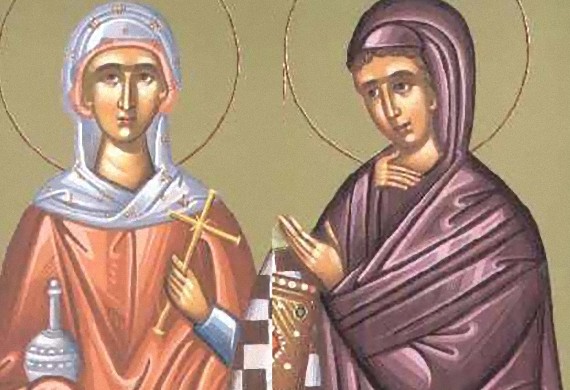 Today’s thought is from an anonymous Desert Father who was questioned about whether it is better to live the solitary life of contemplation and poverty or to devote one’s life to helping others and providing material support to the needy. His answer goes to the heart of the debate whether it is better to follow the way of Mary or that of Martha. (Luke 10:38-42) The brethren said, “There were two brothers who were the sons of a merchant and their father died and they divided their inheritance between themselves. Unto each one, there came five thousand dinars. One of the brothers divided his inheritance among the churches, and the monasteries, and the poor, and he himself became a monk, and he chose for himself a life of continual silence, and fasting, and prayer. Now the other one built a monastery for himself, and gathered brethren to him, and he took care of the strangers, and the poor, and the sick, whom he received and relieved.” “When the two brothers were dead, there was questioning among the brethren about them, and they went to Abba Pambo and asked him, ‘Which manner of life and conduct was the more excellent and exalted?’ And having learned from God, he said unto them, ‘They were both perfect, and in my sight they appear to be of equal merit.’ Explain to us now the elder’s words, for how can the man who is destitute and the man who hath possessions be equal in merit?’ The elder said, ‘Since the whole conduct of these brethren was to God, and since whatsoever they did they did it for God, with an upright aim, and since the aim of each was the same, they appeared to be in the elder’s opinion of equal merit before God.’” |
||||
|
|
رقم المشاركة : ( 13473 ) | ||||
|
† Admin Woman †
|
Sunday of the Blind man
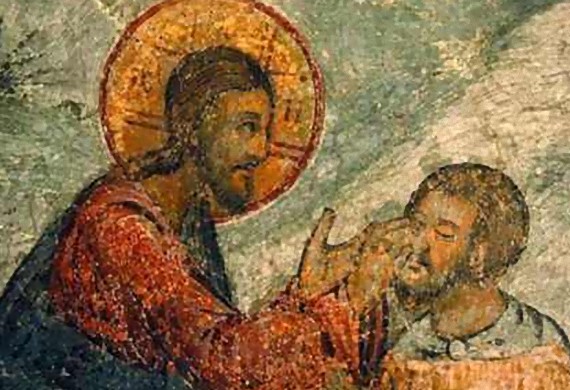 The blind man sees Christ the Saviour, with the eyes of his soul The Gospel reading refers to a man blind from birth. What better, more beautiful and desirable, than for the eyes of a blind man to be opened! The blind man believed in Christ and received healing. He is blind, however he sees Christ the Saviour, with the eyes of his soul. And while God intervenes and gives His light to the blind man the Pharisees are annoyed, and react with hostility. As a result of sin, man is perverted to such a degree that he sees even good things as bad and so judges them. Who of us does not have a Pharisee living inside of him! This becomes clear the instant God allows something difficult to happen in our lives. And while God, with that which he concedes, helps the eyes of our souls to open and see Him, we react against it. We do not trust in Him. About this, our lack of faith, Jesus said: “For judgment I have come into this world, that those who do not see may see, and that those who see may be made blind. ”Man must see his sin and humble himself. When you have an idea about yourself -you think you’re something great, that you know it all – this attitude of yours prevents God from illumining the eyes of your soul. And yet, the more you spiritually advance and see your sin, the more you are disappointed and despair in yourself. And then, however, something odd happens: while feeling you are blind, you begin to see. You see your sin by the grace of God, which illumines you, purifies you, and saves you. Holy Hesychasterion “The Nativity of Theotokos” Publications. Archimandrite Symeon Kragiopoulos |
||||
|
|
رقم المشاركة : ( 13474 ) | ||||
|
† Admin Woman †
|
Spiritual counsels
Sorrows Sorrows bring us closer to God. And when we think the eternal profit we get from sorrows, we should not be sad. St. John the Chrysostom Illness Since God is preparing for us the crown of Ηis Kingdom, then illness should become a cause for virtues. St. Basil the Great How do we talk with someone else Before you listen to the other person, you should not respond. First listen carefully and patiently. “To answer before listening— that is folly and shame.” (Book of Proverbs 18, 13) St. Seraphim of Sarov Translated by Dr. Nick Stergiou |
||||
|
|
رقم المشاركة : ( 13475 ) | ||||
|
† Admin Woman †
|
Thomas Sunday
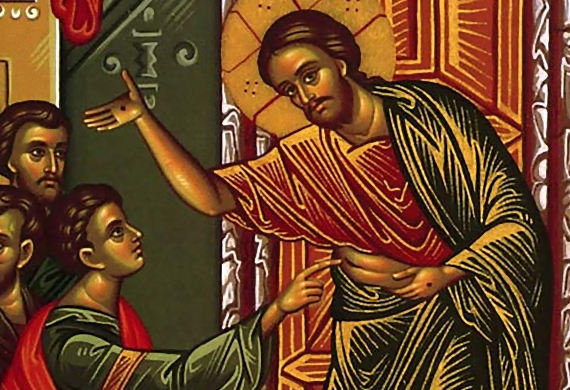 “Blessed are those who have not seen and yet have believed”. Based on these, the Lord’s words to the apostle Thomas, we are able to glean insights into our spiritual life and progress. First, if we seek to be present there where prayer happens –where God speaks to us and where we are blessed –then we will be filled with grace. And what an amazing experience it is to have no other thoughts but those which proceed from faith, i.e., that by prayer we persevere through the onslaught of thoughts, which act –in this way or that –as temptations, as trials, or as difficulties. And yet, they are nothing! Don’t pay them any mind, even if it seems the Lord is not present,or that he doesn’t hear you cry out, and doesn’t answer you. Just leave these things. And by faith, you will become, in reality, blessed. What more could you want? Indeed, we must believe without seeing,without the Lord showing us anything (i.e., some allegedly miraculous thing, just as Thomas expected). This is what the Lord wants –what he waits for. This is the faith that moves mountains and puts sin to death, puts the self to death, and puts faithlessness to death. And by this, man becomes a truly heavenly human being. You shouldn’t be obsessed with seeing some supposed miracle, with feeling a certain way, with understanding as you think you should, or with living some lofty experiences and then believing. No. You must simply run to Christ. And right there where you stand and say a few words of prayer, Christ will be alive and present in your soul, through which he will work miracles. Holy Hesychasterion “The Nativity of Theotokos” Publications. Archimandrite Symeon Kragiopoulos |
||||
|
|
رقم المشاركة : ( 13476 ) | ||||
|
† Admin Woman †
|
Noble souls are initiated into the joy of the Resurrection
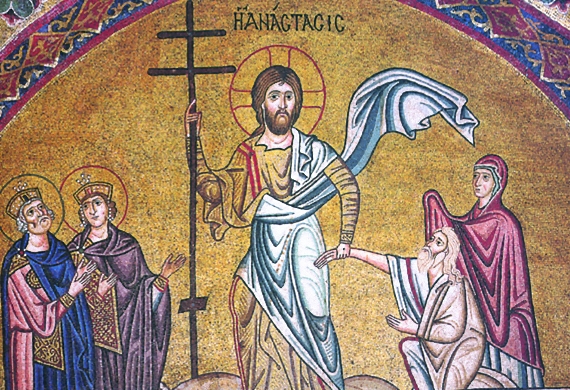 “This is the day which the Lord hath made: let us rejoice and be glad in it”. The Church calls us to rejoice and to delight in this day, the Lord’s Resurrection day. Every Christian, when hearing the ringing of the bells, remembers the church, the priests, the Church services, and something happens in his soul, through the mystical flame within him; no matter where he goes, the grace of the Holy Spirit remains deep within him. Those with noble souls take things seriously (humbling themselves before the Lord, repenting, cutting off those things which separate them from Christ). They are initiated into the joy of the Resurrection, and they bless the Lord. There are certain souls that live within a spiritual intoxication. They live paradise, and experience the rivers of joy as they continue towards “unending perfection”. These holy souls live with gratitude: they seek nothing more from God, but rather thank Him who abundantly gives his joy, his delight, and heavenly goods. God gives himself in such a way, that it is not uncommon for these souls to say: “All of this is sufficient, Lord: I can’t bear any more.” It is an indication that the soul is on a good path, when it feels inspiration, has desire and yearning, the longing to leave the world and to be found in eternal life, in the kingdom of God and to taste the rivers of joy, and the heavenly delight of the resurrection. Holy Hesychasterion “The Nativity of Theotokos” Publications. Archimandrite Symeon Kragiopoulos |
||||
|
|
رقم المشاركة : ( 13477 ) | ||||
|
† Admin Woman †
|
The Lord’s Pascha
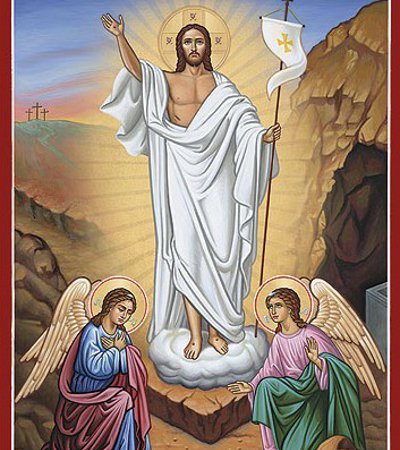 “This holy and great Lord’s day Shortly before midnight on Holy Saturday, church bells invite the faithful to take part in the flood of light and joy of the Resurrection of Christ from the dead.of Pascha we celebrate the actual life – bearing resurrection of our Lord, and God, and Saviour Jesus Christ”. At the end of the Small Panyhida, the Bishop or Priest will light his candle from the vigil lamp of the Sanctuary and will invite the light – formed children of the Church to receive light with these words: “Come receive light from the light, which is never overtaken by night, and glorify Christ, who has risen from the dead”. Then taper by taper and candle by candle the people give and take holy light, and the darkness of night is flooded by light, and everything calms down, and everyone’s soul becomes peaceful and their hearts beat with divine hope. Darkness has no duration; No it can not have any duration!… NO! . .. Death cannot and is not permanent! … The Light from Light, the true God, whom we saw earlier powerless on the Cross, and dead with his arms crossed, and immobile, being buried by Joseph of Arimathea in his own grave, after having enlightened with His presence the Storehouses of Hades and after “He went and preached to the spirits in prison” (1Peter 3:19), He prevailed over death, granting light, joy, life and resurrection to suffering mankind. And this sea of lit Easter candles, which is blown about by the spring night breeze, is the reply of the believers to the nonsense and empty words of disbelief and agnosticism, the answer to the wretchedness of doubt and of atheism…. The Gospel reading from the Gospel according to Mark ( 16:1-8) – the 2nd “Eothinon” Gospel – is the scriptural pronouncement that Jesus the Nazarene, the Crucified, “has arisen, He is not here”, in the strangers grave that is, which had given Him hospitality. This trumpet blast of the rising of Christ from the dead is given wing by the bright and joyful plagal first tone of our Byzantine music, and is announced to all the worlds visible and invisible: Christ is risen from the dead, by death He has trampled on death, and to those in the tombs He has granted life”… The night hears it and celebrates. The trees hear it and “clap their branches”… The “night-flowers” and the “holy –vine” (aromatic flowering plants) hear it and pour out their aroma from joy.. The “Paschalia” flower hears it, and decorates itself with all its beauty… The wind hears it, and whistles it on land and on the sea…. It is caught by the waves and is babbled to those whom they have enclosed in their wet embrace from centuries ago… It is caught by the whale which swallowed Jonah at one time, its whole being is shaken, and it rejoices that the “sign” has now become reality, and is proud that its word to the other whales and to “all the creatures that move in water” has come true in such a festive way. It is heard by the stars, and they polish their silver… The moon the footstool of the Theotokos, hears it, smiles, and shines brighter… The animals hear it and jump around with joy… It is taken by the bell-towers and they ring joyfully. The whole creation takes it and announces it everywhere, even right down to the nethermost regions, to the naked bones, the flesh that wasted away in expectation, to the souls that rest expecting and awaiting the rising of the dead …. After “Christ is risen” the hymn of joy, has been chanted again and again, an old custom has it that the door of the church be closed, and the dialogue, used during the consecration of the church, starts up: “Open your gates you princes, and be lifted you eternal gates, and the King of Glory shall enter. Who is this King of Glory? The Lord strong and mighty, the Lord mighty in battle. Open your gates you princes… (Psalm 23, Septuagint). And at the end, at the third question, together with the reply “The Lord of might. He is the King of Glory!… “, the door is kicked wide open by the Bishop or Priest, who enters the Holy Temple with grandeur, chanting, in the joyful first Tone the most sweet “Canon” of the Resurrection, a composition of St John Damascene: “This is the day of Resurrection, let us be radiant O people, it is Pascha the Lord’s Paschal… “. There is no sweeter, gracious, brighter, enjoyable festive or melodious hymn of the Orthodox Church than this “Canon”. where the Theology of two chief Fathers, Saint Gregory the Theologian and Saint John Damascene is interwoven. St. John Damascene was the one who also composed the stanzas to it, “Now everything is filled with light, heaven and earth and the nether regions.. “. “Yesterday I was buried with you. O Christ, I will rise with you today with your resurrection…”. “We celebrate the mortification of Death and the degradation of Hades, we celebrate another life, the first and eternal one, and jumping for joy we praise the cause, the only blessed one of the fathers, the most glorified God”. “As something holy and all-celebrated is this salvatory night and dawn…”. “This chosen and holy day, the one after the Sabbath, the royal and sovereign one, is the celebration of celebrations, and festival of festivals…”. “O Christ, the great and most holy Pascha; O wisdom and Word and power of God, grant us that we may most clearly participate in the never-ending day of your Kingdom…”. And in between the stanzas of the Canon is chanted “Christ is risen”. and again “Christ is risen”, and again many times “Christ is risen”… So that the ear can satiate itself, that the soul burnt out by the furnace of the Cross of Great Friday can cool down and refresh itself, so that the redeeming message can saturate all the cells of the body, the joints, the kidneys, the heart…. At the chanting of the Praises (Ainoi) the veneration takes place; the veneration of the Gospel Book, which always is the image of the Risen Christ “in paper and ink”, and we exchange with the Priest the all-joyful greeting – Christ is risen!… Truly He is risen! kissing his right hand. This is our meeting with the Risen Lord. As He was met by the Myrrh-bearing women and the Apostles and their souls rejoiced, so we see Him in the all-holy Book of His word. We kiss His immaculate feet and hear with the ears of our soul, coming from His holy mouth the word “Rejoice” and our soul fills with happiness and joy, because the “Rejoice!” from the mouth of Christ is not a simple greeting, but a direct transmission of divine joy and well-being. To the Praises of the first Tone are added the Stichera of Easter: “A sacred Pascha has been shown to us today; A new Pascha, a holy Pascha, a mystic Pascha, an all venerable Pascha, Pascha which is Christ the Redeemer. a spotless Pascha, a great Paschal…”, which brings directly to mind St Gregory the Theologian, “But O Great and holy Pascha and cleanser of all the world, for I converse with you as with a living soul; O Word of God, Light, Life, and Wisdom and Power; I rejoice in all your names “(Homily of Easter). Yes!.. Yes!… The Pascha of the believers, our Pascha, is not a feast. It is a person. It is Christ Himself; the Word of God, the true Light, Life itself: the all-powerful Strength and Wisdom of God which created the world. He passed us over, not again through a Red Sea dryshod, chased by the Egyptians, but chased by the noetic Pharaoh, the devil, He passed us from the salty sea of sin and from the abyss of death, to the joy of forgiveness and communication with God, to the life of blessedness and eternity. He “passed us” from the dry land of our exile, to the bedewed heavenly nation, to the gladness of the firstborn… Glory to God! The same holy Father of the Church is brought to our memory by the superb and most joyful of hymns, the Doxasticon of the Praises: “It is the day of Resurrection, let us be bright for the Festival and embrace each other; here is the exhortation for the brotherly Pascha kiss of love. Let us say brethren to those who hate us, let us forgive all things for the Resurrection and thus let us cry, Christ is risen from the dead….”Where almost word by word, are repeated the words with which St. Gregory started his famous Homily “To the Holy Pascha and to lateness”. And after the Praises and the Kiss (which in older times was a Kiss by everyone among themselves, a holy Kiss, according to the exhortation of the Doxasticon as we already said), the senior cleric reads the famous Catechetical homily of St John Chrysostom (today it is the custom, unfortunately not according to proper order, for it to be read at the end of the Divine Liturgy): “If anyone is pious and God-loving, let him enjoy this good and bright festival…”. The golden mouth of the Church, St. John Chrysostom, calls the pious and God-loving people, the grateful Servants of God, the honourable workers of the divine will, but also all those, who, even at the last moment moved by a sense of honour, would like to approach, to enter into the light-filled joy of the Resurrection and to enjoy of the “banquet of faith”. “Let no one grieve at his poverty, for the universal Kingdom has been revealed. Let no one lament their transgressions, for forgiveness has dawned from the grave. Let no one tear death, for the Saviour’s death has freed us”. In these phrases is condensed all the meaning which the Resurrection of Christ has for us people. Forgiveness of sins at one end, and freedom from the power of death, eternal life that is, at the other end. Now then “death where is your sting?” Where is your poisonous sting with which you stung, poisoned and Killed humans? “Hades where is your victory?” Hades where are your victories over humans, which you boasted, that no one would escape? “Christ is risen, and you are overthrown. Christ is risen, and demons have fallen. Christ is risen, and Angels rejoice. Christ is risen and life goes on. Christ is risen and there are no dead in the tombs”! Because Christ arose from the dead, became the beginning, the offering, the ransom of the dead! To Him belongs glory and dominion to the ages of ages. Which Christian heart has never been moved on hearing these words? Which soul-strings have not vibrated? A heart must be of stone because of apathy so as to remain unmoved, not to soften, not to feel compunction, not to feel the vibrations of Grace upon hearing these all-sweet. most pleasurable. God-inspired words of the divine Chrysostom!… At the Resurrection Liturgy (always Chrysostom’s) instead of the Trisagion (Holy God, Holy Mighty, etc) we chant “Those of you baptised in Christ, have been vested with Christ. Alleluia”, because in the early Church, the Catechumens were baptised on Great Saturday, who newly -lightened now, entered the church at this time in procession, dressed in all-white and holding lit candles in their hands, so as to take part, with all rights of worship, in the Liturgy of the Faithful. In the late morning or the afternoon of the Sunday of Pascha we celebrate with all formality the Vespers of Love, during which it is customary to read the Gospel reading (the 9th Eothinon, without the last paragraph) in many languages, so that the salvatory message of Christ’s Resurrection can be understood by more people, so that they can also accept it and enjoy salvation in Christ. The week of Pascha (Renewal or New Week) is considered, in a way, as one day with the actual day of Paschal. The resurrectional Divine Liturgy is celebrated every day in identical fashion to the Sunday of Resurrection with the same exact festive order. Vespers is also celebrated identically with the vespers of Love (except the Gospel reading), with the clergy wearing “the whole set” of their vestments. The late Metropolitan of Ierapetra and Siteia, of blessed memory, Philotheos (+ 1993) wanting to stress this unity of the seven days in the Renewal Week and established that at the Synaxarion, the memorandum, “On the holy and Great Sunday of Pascha, we celebrate the life-bearing resurrection of our Lord and God and Saviour Jesus Christ…” be read every day until and including Saturday. In the blessed countryside of Greece, the priests have the custom of liturgising every day during Renewal Week in every one of the country chapels attached to their Parish, so that the victory song of the Resurrection can be heard further out from the town. And many are they that go out to the countryside for those Resurrectional Liturgies. They remind us of Papadiamantis, combining the joy of Paschal worship with the joy of nature in Spring. On the Holy Mountain (Mt. Athos) the monks celebrate litanies from the monasteries to various “Kathismata” and in the gardens, where we usually find a small chapel and where an Agiasmos is celebrated. This brings the joy of the Resurrection to the plants and trees, which supply various fruits throughout the year for the monks’ austere table. The novice monks learn the art of bell ringing during Renewal Week. It is a great pleasure to hear the bells pealing joyfully every day, all day, throughout Mt. Athos. Even the elderly Fathers sometimes during the Services, exit the church, take up hand-held wooden semantra and walk around the church hitting them rhythmically, so as to emphasise their enthusiasm about the definite and irrevocable condemnation of death, for the ever mortification of Hades, and for the eternal victory of Life…. “Jesus having risen from the grave, has given us eternal life and great mercy”. BY METROPOLITAN JOSEPH OF PROIKONESSOS |
||||
|
|
رقم المشاركة : ( 13478 ) | ||||
|
† Admin Woman †
|
Holy and Great Friday
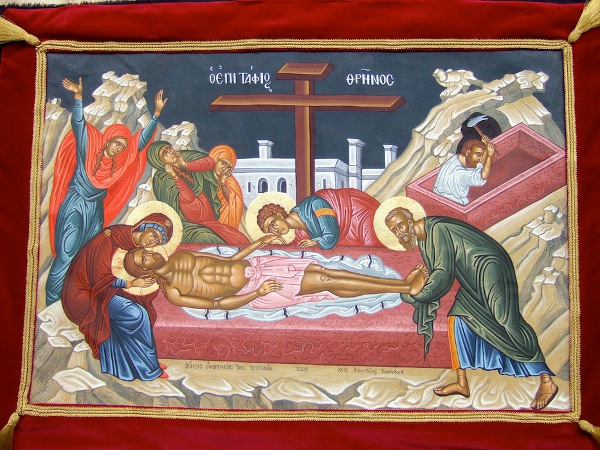 The all-respectful Holy and Great Friday dawns full of compunction. Liturgy is not celebrated on this day. In olden days the Presanctified Liturgy was performed, but the Church later deemed it better that on this so mournful day no Liturgy will be celebrated. Therefore in the morning we have the Service of the Great and Royal so-called Hours, with Old Testament readings, psalms and prophecies which refer to the Messiah and the Passion, suitable hymns and Apostolic and Gospel readings. Vespers follows. It has been customary for at least the last two centuries for the Apokathelosis to take place when the the appropriate part of the Gospel is read. The icon of the crucified Lord is disconnected and taken down from the Cross, wrapped in a white sheet, and kept in the Holy Sanctuary of the Church. It is a novelty which, for either good or bad, has become a custom, although it is not on the Holy Mountain or in the Great Church of Constantinople. As the verses of the Aposticha “Down from the Cross Joseph of Arimathea took You dead, Who are the Life of all” are chanted, a procession exits the Sanctuary with the Book of Gospels (that is an icon “in paper and ink” of the Word of God), with a large stiffened piece of cloth. This cloth is today called the Epitaphios and has an icon of the Dead but still Author-of-Life Lord painted or embroidered on it. It is placed on the holy Kouvoukleon in the centre of the church, which is decorated with flowers of worship and myrrh of gratitude of the faithful, for its proper veneration. We should say that in earlier times the so-called Epitaphios was none other than the well-known “Aer” with which the priest carries the Holy Gifts from the Prothesis to the Altar during the Great Entrance in the Liturgy. Already the Book of Gospels is in danger of losing priority of honour before the Aer-Epitaphios, although the Gospel Book is always and distinctly visible in our Church as the presence of the Church’s Bridegroom and Teacher. Worthy of note is the excellent hymn “You who have put on light as a garment…” which is chanted as a Doxasticon of the Aposticha and poetically draws with unattainable lyricism the worshipful lamentation of the noble Joseph. In the evening, the Service of the Graveside Lamentation that is the Matins of Great Saturday is chanted. The superb Canon “He who in ancient times hid the pursuing tyrant beneath the waves of the sea…”, a poem written by Sts Kassiani and Kosmas the Poet, shows us wonderfully the Theology of the Lord’s Passion, while the memorandum of the Sinaxaristes reminds us: “On the Holy and Great Saturday we cerebrate the Burial of the Divine Body, and the descent of our Lord and Saviour Jesus Christ to Hades, through which He restored our kind, from corruption and transplanted it to eternal life”. After the Canon “Engomia” (Praises of the Epitaphios Lamentation), three lots of brief verses full of lyricism are chanted by the together with the chanters. Of these chants, which are especially love by the people and chanters, I here select from the second stasis (lot): “Wounded in our Side, O Word, through the life-giving drops of Your Blood as the pelican You have restored Your dead children to life”. Legend has it that when a poisonous snake bites pelican chicks of the, their father, as soon as he notices that they are slowly dying, rips his body with his beak and feeds them with his own blood that acts as an antidote. In this way, he sacrifices himself for the survival of his chicks. It is a beautiful image of the Theanthropos (God-man) who willingly sacrifices Himself on the Cross and sheds His All-Holy Blood and feeds us; us who were bitten by the “ancient snake” and poisoned with the poison of sin and are in danger of eternal death. Therefore with His ineffable sacrifice and life-giving Blood, we are saved and pass into eternal life. I make a parenthesis here to say that on my last visit to Cyprus, last October, when I climbed as a pilgrim to the Royal Monastery of Panagia Kykkou, I was pleasantly surprised to see this image of the pelican in a magnificent contemporary mosaic on the balcony of the Monastery. It is note-worthy to underline the Doxasticon of the Praises, “Moses the Great mystically prefigured this present day, saying: ‘And God blessed the seventh day’. this is the most-blessed Sabbath, it is the day of rest. and on it the Only-begotten Son of God rested from all His works, and through the dispensation of death, in the flesh He rested; and returning once again to what He was, through His Resurrection He has granted us eternal life, for He alone is good and loves mankind…” There is a nice theological combination of the old Sabbath of the Creation with today’s Saturday of the Burial of the Most-holy Body of Christ. The first sounded the end of the Creation, whereas the seconded sounded the end of the Re-creation and Re-birth. The protagonist at both is the same One. The One both before all-Time and for the people also the New One. The Son and Logos of God, the only Good and Merciful Lord. The procession with the Epitaphios occurs after the Doxology. The Sepulchre is carried around the boundaries of the Parish for the sanctification of the whole of nature, living and lifeless, by the Creator Who “sleeps as if He was dead”. The Engomia are chanted again or that most beautiful hymn full of lyricism, the ‘asmatic idiomelon’. The asmatic idiomelon has almost been forgotten, but we here in Adelaide chant it and at least wherever the Bishop is officiating and at the return of the holy procession back to the church. The asmatic idiomelon is: “The sun having hidden its own rays, and the curtain of the Temple being torn because of the Saviour’s death, Joseph beholding all this, comes to Pilate and beseeches him; give me this Stranger, Who as a child was estranged as a stranger from the world… “. In Greece the procession of Epitaphios has a special atmosphere. The chanters’ melodies as well as the people’s, the lit candles of the faithful which flicker at the blowing of the breeze, the aromas of spring, the incense, the lit candles in the windows of the houses, the rosewater and rose petals which pious women throw onto the Sepulchre as it passes by, the mournful tone of the bells, all these help in emotionally charging the people who follow the Funeral procession of the Life, expecting mystically the joy of the Resurrection. Great (Holy) Saturday is a day of silence. The Life sleeps!… Therefore, “Let all mortal flesh keep silent and stand with fear and trembling, and ponder nothing worldly within itself.. ” (as the superb Cherubic Hymn of the day prescribes). It is, at the same time, a day of very strict fasting. It is the only Saturday of the year on which there is obligatory fasting (the fasting of oil as well). In the morning, the Vespers of Easter is celebrated with the Divine Liturgy of Saint Basil the Great. We, at this time, have the first taste of the Resurrection as we hear “Lord I have cried..”; the most sweet resurrectional hymns of the First tone, which have been granted to us by the God-inspired muse of Saint John the Damascene. The beginning of the first chapter of Genesis is read, which describes the Creation up until the third day. Following this the first four chapters of Jonah are read. The Prophet Jonah is a “sign” or model of Christ and His three-day death. The Lord Himself said that “you ask for a sign but it will not be given to you, except the sign of Jonah the Prophet”. You may remember that Jonah lived three days in the belly of the whale, and “from the belly of Hades”, as the holy Book says prophetically, he prayed fervently to the Lord, and on the third day he was returned alive and unhurt. Our Lord stayed three days in the depths of Hades and arose on the third day… This is followed a reading from the Book of Daniel on the golden statue of Nebuchadnezzar and the refusal of the Three pious Youths to worship the royal idol, their casting, into the fearsome furnace, their excellent prayer, and their redemption by the Angel of the Lord. This appearance, according the tyrant Nebuchadnezzar’s own confession, was “as a vision of the Son of God”, because it really was Him who personally came to save His pious children!… Lastly the excellent, sublime, most sweet Hymn of the Three Youths is chanted solemnly, “‘0 all you works of the Lord, bless the Lord; Praise the Lord and exalt Him above all for ever. . “, which has moved billions of souls since the time it was chanted in the Babylonian furnace right up to the present days!… In the past, mass baptisms of Catechumens were conducted on Great Saturday. Therefore until today, instead of the hymn “Holy God…”, the hymn “As many as have been baptised in Christ, have put on Christ. Alleluia” is chanted, and the Apostolic reading of Baptism is read (Rom. 6: 3-11). After the Apostolic reading, with dignity and formality in the Grave tone (7th), we chant: “Arise, O God, and judge the earth; for You shall have an inheritance in all the nations”. The bells sound joyfully, festively… The Priest, with bright and white vestments, comes out of the Sanctuary chanting and scattering bay leaves (which always symbolise victory and glory). The victory of Life is preached against death… The Church starts to celebrate the triumph of Her Bridegroom… In the lonian islands at this time, people vehemently throw ceramic (fire-tempered) objects out of their windows. The objects are broken to pieces, “to kommati”, symbolising the destruction that takes place in the gloomy kingdom of Hades with the descent of the Author of Life… At this point allow me to read to you a very nice text of a current scholar, which is related to the descent of the Lord to the kingdom of death: “What quaking, what fragmentation down in Hades! The brilliance of the Divinity gushed through at this hour, on this day, and everything moved from their place, the monuments, the tombs, the dead. They took the way towards the upper regions, towards light, towards life. There is no duration to night, to darkness. There is no continuation to death. The truly Eternal One trampled on the false powers, He crushed them, He disbanded them… The mortified and dishearten world took courage, took breath. Breathless Lazarus shouted from Tartarus: Make haste, Lord, until Sunday do not leave anything non-resurrectional, nothing with a sign of corruption. Everything has prepared for You the new forehead for You to kiss with a paschal kiss. Everything waits for You with haggard faces, purified, to be sealed, to give them a name in the new creation. To say that from now on everything is Yours and they do not only hold soil in their hands, but they hold heaven as well, scenting immortality and seeing eternity…” (from People of Grace by Metropolitan Evangelos of Perge). On Great Saturday, according to an ancient tradition of the Holy Fathers, the faithful privately read the Acts of the Apostles until the bells call us to the Service of the Resurrection, the feast of feasts, and the festival of our festivals… Here ends the Great Week. The New and Resurrectional Week starts, the ‘Diakenissimos'(Renewal) – as it is officially called – the bright and happy week of Easter. We won’t go any further. We will only say that the whole of the psycho-somatic elevation of the Passion Week has as its goal our meeting with the Risen Lord. To our Passover (Pascha) from the slavery of sin and death of passions, to the life of the evangelic state, to the Risen Christ’s life, the life which will be the preface and foretaste of the great, the eternal, the true life in the endless joy, the never waning light and endless festival of the Kingdom of the glorified Bridegroom and of the mankind-loving Father and the Spirit of Truth!… Happy Easter, beloved. “for indeed Christ our Pascha was sacrificed for us” (1Cor 5:7 BY METROPOLITAN JOSEPH OF PROIKONESSOS |
||||
|
|
رقم المشاركة : ( 13479 ) | ||||
|
† Admin Woman †
|
Holy and Great Wednesday
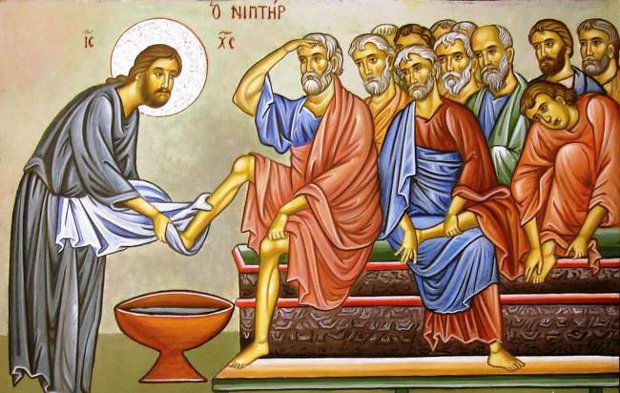 On Great Wednesday afternoon Small Compline is performed and the theologically profound Canon of Saint Andrew, Archbishop of Crete the Jerusalemite, is chanted: “Furnished and ready, the upper room received You, O Creator, with Your companions at the Mystical Supper. There You have sent Your two disciples to prepare the feast for You; there You have kept the Passover, and performed the Mysteries…” It is quite clear that it refers to the Mystical Supper and to the institution of the Sacrament (Mystery) of the Divine Eucharist from the Great Chief-Priest Christ to His holy Disciples and through them to all of us. In the evening we chant the Matins of Great Thursday. On Great Thursday “the divine Fathers who ordered all things well” have entrusted us to celebrate four things. These are: (a) The Holy “Nipter” (Washing). During the Mystical Supper, Christ gives a superb example of humility and modesty to His disciples, washing their feet and wiping them with the “lention” (towel). Humility is the first and basic virtue which should characterise the worker of the Gospel and every Christian. (b) The Mystical (Last) Supper, which gave “…us the dread Mysteries (Sacraments)”. At each Divine Liturgy, since the Mystical Supper, the Church repeats Christ’s holy words: “Take, eat this is my Body…” and “Drink of this all of you for this is my Blood of the New Covenant, which is shed for many, for the forgiveness of sins”. (c) The extraordinary Prayer of our Lord in the garden of Gethsemane. Praying with agony, His absolute submission to the plan of Divine Economy for the salvation of the world, and the absolute obedience to His Heavenly Father He showed that not only was He the Pre-eternal God, but a complete human as well. And here He fooled the devil who could not understand that it is possible, that someone who prays can be God, and therefore proceeded in his plan against Jesus. At the same time He left us an example and model of prayer and obedience. (d) The Betrayal. As one hymn from the Praises characteristically says, “Judas, the deceitful traitor, with a deceitful kiss betrayed the Lord and Saviour; he sold the Master of all as a slave to the transgressors; the Lamb of God, the Son of the Father, went as a sheep to the slaughter; for He alone is rich in mercy”. The friendship was dishonoured. The kiss was contaminated. The greeting was degraded. Love was betrayed… It is the hour of darkness!… >From then, no Christian accepted the name of Judas, even though there was another Apostle called Judas, a Saint who has nothing in common with the Iscariot. The name of Judas became synonymous with a curse. A masterpiece of our hymnography is the Doxasticon of the Aposticha for the day which is chanted in the sweetest plagal of the 1st tone (tone 5): “Instructing Your disciples in the Mystery, O Lord, You have taught them saying: ‘My friends, take care that fear does not separate you from Me. For though I suffer, yet it is for the sake of the world. Do not be scandalised because of Me; for I have come not to be ministered to, but to minister, and to give My Life as a ransom for the world. If then you are My friends you will do as I do. He who wants to be first, let himself be the last; let the master be as the servant. Abide in Me, that you may bear fruit: for I am the vine of Life.”‘ It is customary in our Churches to perform the Holy Sacrament of Efcheleon (Unction) on Great Wednesday. Because ancient tradition has it that the Orthodox take part in the Immaculate Mysteries (Holy Communion), especially on Great Thursday, when we remember liturgically the giving of the Sacraments from the Lord to the Apostles during the Mystical (Last) Supper. It is thought that the Efcheleon comes as a last preparation of soul and body which completes the fasting, prayer and confession. Of course the main purpose of Efcheleon is largely to strengthen the health of the body. It is a divine help for the recovery and restoration of the sick. BY METROPOLITAN JOSEPH OF PROIKONESSOS |
||||
|
|
رقم المشاركة : ( 13480 ) | ||||
|
† Admin Woman †
|
Holy and Great Tuesday
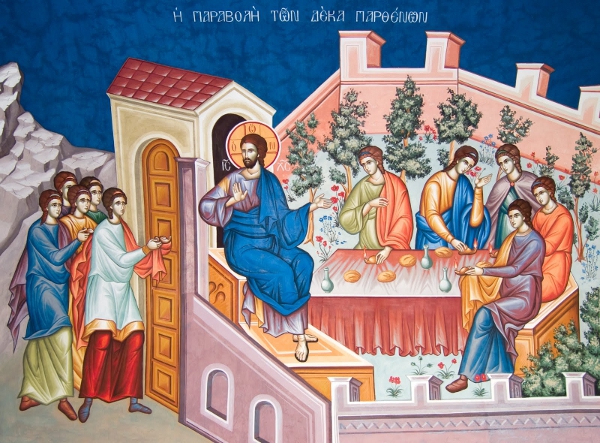 On Great Tuesday, our Church remembers the Parable of the Ten Virgins and advises us to follow the example of the five wise ones; to have lit the lamp of faith and virtue, to have a good supply of the oil of good works and to be alert towards our meeting with the Bridegroom Christ “since I, O Christ the Bridegroom, have permitted my soul to slumber in indolence”. This is also stressed by the ever so sweet hymn of the Praises, “I do not possess a torch aflame with virtue, and like the foolish Virgins, I meditate when it is the time of work. Close not against me, O Master, Your compassionate heart: but rouse me up to shake off my heavy sleep. and do You bring me in with the wise virgins to Your bridal chamber, where there is the pure song of those who feast and unceasingly cry; O Lord, glory to You”… On Great Tuesday morning at the Pre-Sanctified Gifts’ Liturgy the Gospel lesson of the Parable of the Talents is read out. In this way the hymnology of the day advises us to be careful, that what happened to the evil servant who hid the talent, his master gave him, in the ground, will not happen to us, but rather to cultivate properly whatever gifts and talents God has given us. Thus following the example of the diligent servants who received the five and two talents and doubled them. At the same moment on the horizon appears the dark shape of Judas, the son of bereavement. He has started to move, to approach the enemies of the Teacher, to promise the betrayal and to agree to the shameful exchange. “Judas in his mind is greedy, disgracefully he moves against the Teacher, he decides, he studies how to hand Him over, he falls from the light, accepting darkness: he agrees to the price, he sells the Priceless One….”. The hour of the most horrible ingratitude and the most wretched betrayal since the beginning of the world approaches… On Great Tuesday evening we perform the Matins Service of Great Wednesday. In front of us is projected the form of a woman; a prostitute. The prostitute who shortly before the Passion approached Christ at the house of Simon the Pharisee, fell down at His feet sobbing, wet His feet with the burning tears of repentance, anointed them with a very expensive perfume and wiped them with the tresses (locks of hair) on her head (as the divine Matthew describes in the Gospel which is read the next day at the Pre-Sanctified Liturgy). Almost all the hymns of the day underline the wondrous repentance of this woman and the love she showed to the Saviour. They make parallels between her, a shameful woman who in the end finds Christ and falls in the ocean of His love and is saved, and Judas who having Christ, the treasure of life, betrays Him for 30 pieces of silver; among the honourable kisses which the former prostitute gave to the immaculate feet of Christ and the dishonourable kiss of betrayal which the former disciple and friend gave Him! The repentance which takes someone out of the mud and hell of sinfulness is praised, and the laziness and the soul destroying greed which guided Judas to ingratitude and betrayal are condemned. The climax of the day’s hymnody is the famous Doxasticon of the Aposticha of Matins, the one known to all as the Troparion of Saint Kassiani, the great poetess and hymnographer of our Church: “The woman who had fallen into many sins, perceiving Your divinity, O Lord, fulfilled the part of a myrrh-bearer; and with lamentations she brought sweet-smelling oil of myrrh to You before Your burial. ‘Woe to me’, she said, ‘for night surrounds me, dark and moonless, and stings my lustful passion with the love of sin: Accept the fountain of my tears, You who gather into the clouds the waters of the sea. Incline to the groaning of my heart, You who in Your ineffable self emptying have bowed down the heavens. I shall kiss Your most pure feet and wipe them with the hairs of my head, those feet whose sound Eve heard at dusk in Paradise, and hid herself in tear. Who can search out the multitude of my sins and the abyss of Your judgements, O my Saviour and soul saver? Do not despise me Your servant, for You have measureless mercy!” What can one marvel in this first of all? Is it the poetic greatness, the beauty of the literary contrasts. the lyricism, the wealth of imagery end sentiment, or the depth of theology? One thing is certain, millions of souls have been moved throughout the centuries in which it has been chanted, millions of eyes have been moved to tears and many have been brought to compunction and repentance… BY METROPOLITAN JOSEPH OF PROIKONESSOS |
||||